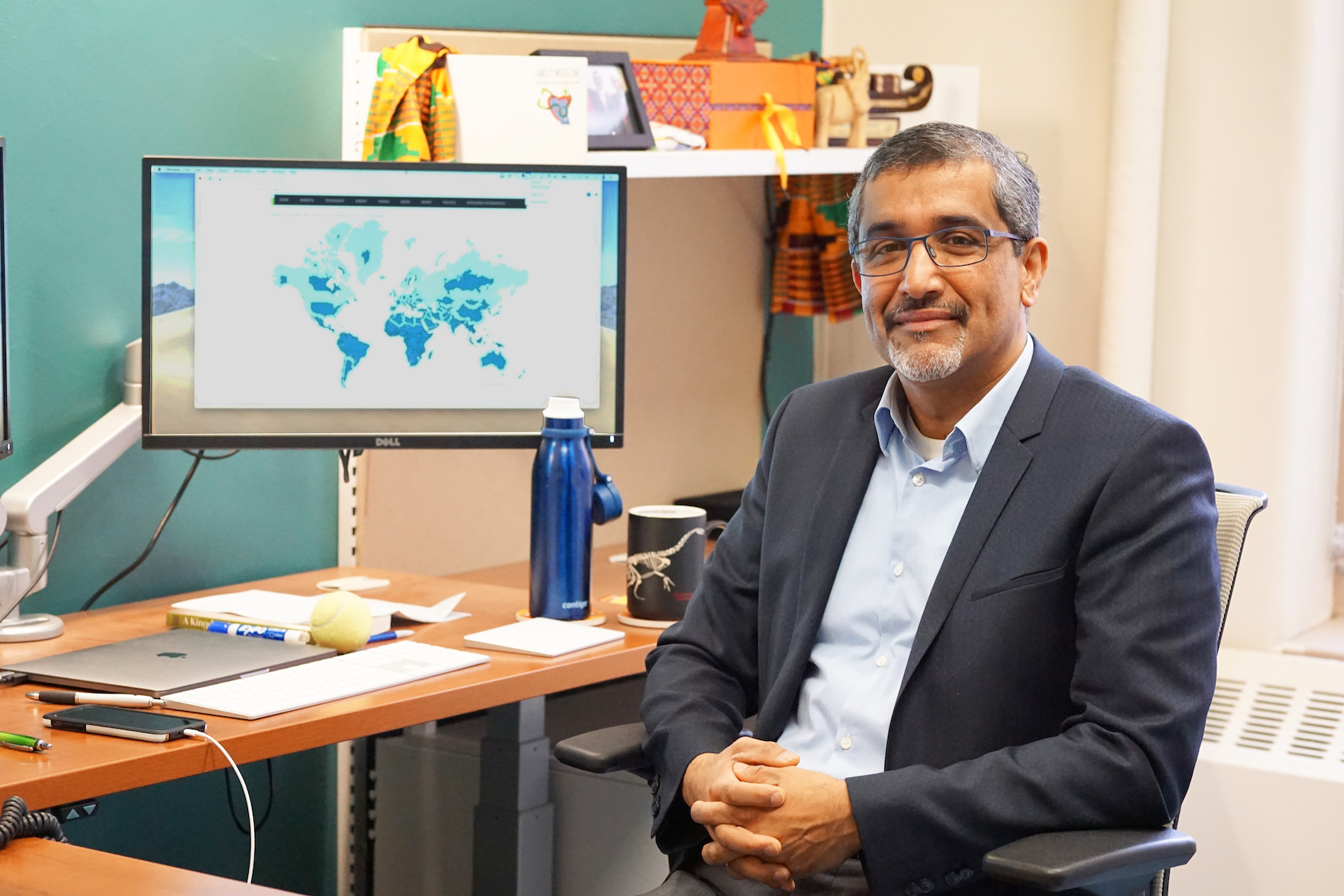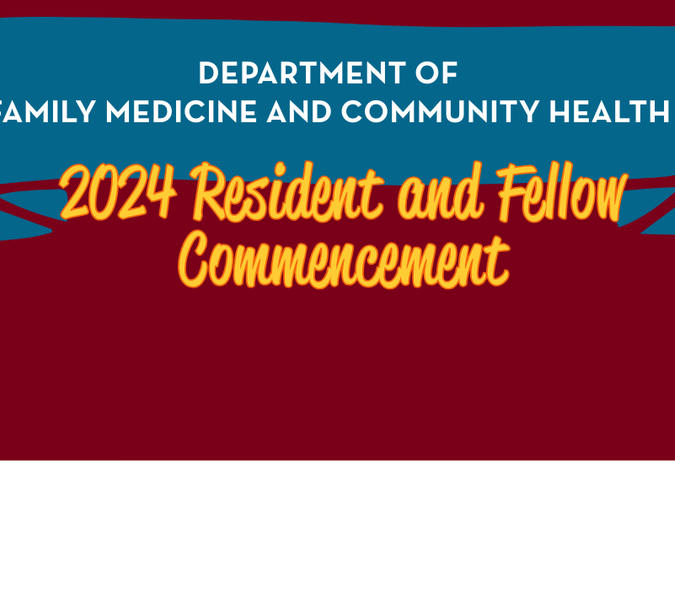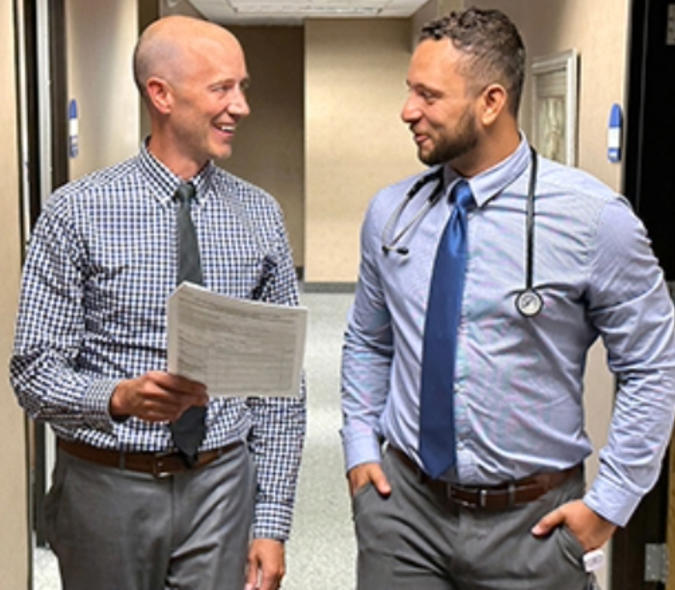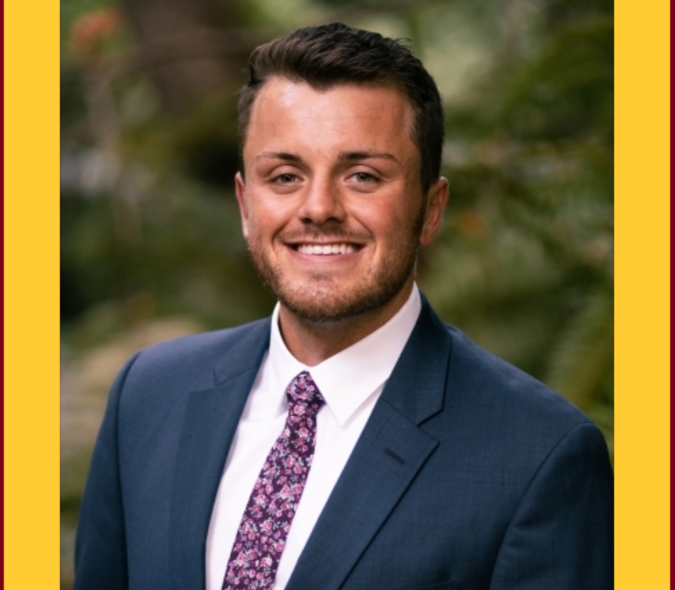The Joy of Discovery
On the computer screen glows a familiar map of the world. A friend has sent Shailey Prasad, MD, MPH, the image, which illustrates the disparity between the map produced in the 16th century - the Mercator projection, which distorts the size of objects the farther they lie from the equator - and reality. A blue overlay on the screen shrinks Greenland to a thumbprint as Africa and South America remain palm-sized.

With the Mercator projection, “You don’t have a true sense of how big or small some parts of the world are,” Dr. Prasad says excitedly, pointing to the screen. “Especially in the Northern hemisphere, you can lose your sense of how small you really are.”
This enthusiasm for new knowledge, and willingness to shift his own perceptions so quickly, conveys Dr. Prasad’s commitment to learning, a credo that defines his role as the new Vice Chair for Education in the Department of Family Medicine and Community Health. “As an educator, when I hear from any student, resident, or fellow that they’re confident they know everything they need to know, I’m concerned. I want to see that curiosity that keeps them going and leads to a joy of discovery.”
A Commitment to Lifelong Learning
As Vice Chair, Dr. Prasad is the point person for the department’s educational activities, working with the leadership team to ensure our educational mission is met. Dr. Prasad is currently gathering data to develop a clearer picture of our educational activities and what success looks like, although his vision for the department is grounded upon the fact that the department’s education portfolio is already outstanding. As one of the largest family medicine departments in terms of educational activities in the country, with a broad spectrum of engagement from undergraduate pre-medical education to medical education to residencies and fellowships and continuing physician education, there is one thing Dr. Prasad believes the department could do right away.
“We should stop being so Minnesota nice,” he says. “Let’s brag a little more.” He adds: “We don’t want to rest on our laurels because we’re doing well, but we should constantly be asking what we can do better and how we can do it better. As an academic department, we can engage in lifelong learning ourselves as well.”
Optimizing the Playground
Dr. Prasad’s own educational history spans the globe. After finishing medical school in India, he worked amongst forest tribes in southern India before coming to Detroit to do further training. It was here that he fell in love with family medicine and turned his attention to residency and fellowship training in academic medicine. He also received his Master of Public Health degree from the University of Minnesota. After a decade practicing rural medicine in Mississippi, he returned to academia with a desire to become more involved in teaching, particularly in resident education.
"Are we choosing brilliant people and providing them a playground, or we are optimizing the playground for whoever comes to play?”
As an educator, he is focused on the question of creating the best learning environment. “One of the questions we should ask is, are we choosing brilliant people and providing them a playground, or we are optimizing the playground for whoever comes to play?” In the field of resident education, he stresses the importance of balancing experiential or service learning and education - such as didactics, reflections, or debriefings. Both are important: you learn as you work, and you work as you learn, he explains. “We need to keep the premise of learning embedded in the context of all the work we do.”
Global Experiences, Social Responsibility
Much of Dr. Prasad’s perspective as Vice Chair has been informed by his experiences in global health training. Since 2017, Dr. Prasad has served as the Executive Director of the Center for Global Health and Social Responsibility (CGHSR), an interprofessional, university-wide center that operationalizes international projects in education, research, and capacity building. He is also the lead for a NIH Fogarty grant that funds the training of global health scholars in seven countries.
With a small team and a large global footprint, the CGHSR engages in a variety of projects, from partnering with the United Nations Organization for Migration to train refugee-camp personnel, to offering seed grants to faculty global health projects - such as a feasibility study of a maternal health model in Kenya, led by Family Medicine Assistant Professor Chas Salmen, MD, MPhil.
Dr. Prasad is also the Director of Global Family Medicine, which facilitates international rotations for residents. “Global health experiences are important because they open up your mind to paradigms and scenarios you can’t imagine as a clinician here. For example, witnessing the sheer volume of HIV care or tuberculosis care in other countries.”
"Global health experiences are important because they open up your mind to paradigms and scenarios you can’t imagine as a clinician here."
He stresses the social responsibility of sending learners to clinics across the world: “Historically, there’s a tendency for some to think they are coming to fix a problem, or save communities. But when we send learners, they go to learn from the fantastic physicians who already have the experience working there.
Bridging the Gap Between Clinic and Community
Clinical models in American medicine are often cut off from communities, a gap Dr. Prasad would like to see disappear. “Family Medicine is different. We work in communities. We have a passion and a responsibility as family doctors to understand the context in which our patients are living. We need to be more engaged.”
The central way Dr. Prasad encourages practitioner engagement is to commit to identifying as a lifelong learner. He emphasizes the role of humility - of being able to accept new maps when they are drawn up. In fact, across the entire journey of becoming a physician - from the first class as a pre-med student to the Continuing Medical Education conference and workshops that seasoned doctors attend - the goal is to maintain an open sense of curiosity.
“Our field and understanding of the human condition keeps changing,” he says. “If you’re not adaptive, you might as well be a fossil.”



